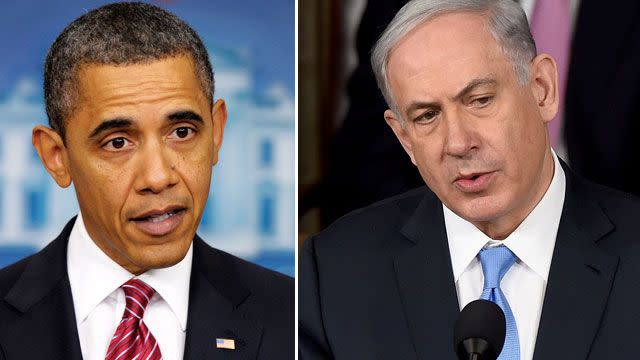 David vs. David
David vs. DavidObama’s Israel-Iran nuclear problem: The United States has nothing but bad choices

A metaphorical gauntlet lies in the middle of Pennsylvania Avenue. Thrown by Israeli Prime Minister Benjamin Netanyahu with his speech to a joint session of Congress on Mar. 3, the gauntlet is the challenge of how to address the Iranian nuclear program and prevent the development of nuclear weapons.
This is not an easy problem; indeed, it may be an impossible one to solve—short of Iranian regime change (and even that sanguine possibility may well not be a solution).
Indeed, Iranian nukes are a legacy concern. Although not much discussed, Tehran’s interest/commitment to developing nuclear weapons dates to the Shah’s era. Iran has persisted, for nationalist, geopolitical, and military reasons, in manufacturing fissile material, developing the technical mechanical processes and designs to construct a nuclear warhead, and manufacturing missile delivery systems for such warheads.
Moreover, Iran sees itself both as living in a dangerous neighborhood and wanting to seize leadership regionally and for Islam generally. It knows the USG is hostile (Washington hasn’t had relations with Tehran for longer than it’s had no relations with Beijing); it also appreciates that a nuclear weapons state has never been attacked, while those giving up weapons of mass destruction (Libya, Iraq) have rued the day. Its leaders recall the Pakistani leader who said his people would “eat grass” before they gave up their nuclear program. One suspects Tehran is willing to put Iranians on a comparable diet—regardless of privations from economic sanctions.
Opposing view: Tough economic sanctions can lead to a stronger agreement
Such confrontation is not new: See India, Pakistan or North Korea. In each of these countries, we attempted to thwart a nuclear weapons program. For India and Pakistan, we accepted their lies, prevarications, misdirection, misleading actions, and ambiguous intelligence analysis to reach conclusions that they were not (necessarily) developing nuclear weapons. Obviously, we were wrong. For North Korea, again, we accepted lies as truths, hoping that various economic carrots would sidetrack their program. For various reasons, we rejected kinetic action—essentially fearing that it would spark war on the Korean peninsula. We believed the South with United States government (USG) support could win, but not easily. We remember our 50,000 dead from the Korean War.
Thus, three times over, we have made major, multilateral efforts to prevent a state from becoming a nuclear weapons state. And failed.
Bluntly, there is no chance that the much bruited-about “agreement” with Iran will prevent Iran from obtaining nuclear weapons. In the broadest terms, the agreement would permit Iran to retain stocks of fissile material, centrifuges capable of generating further enriched fissile material, and a limited period of international inspection, e.g. 10 years, after which there would be no further inspections or economic sanctions. Economic sanctions would be removed during the course of the agreement.
Indeed, USG policy seems driven by the Charles Dickens’ character Mr. Micawber and his philosophy that “something will turn up.”
USG and Israeli differences appear unbridgeable: the USG believes Iran’s nuclear challenge can be managed/manipulated/negotiated; Israel believes it is an existential threat to its future. Obama seeks a good-enough-for-now “legacy” agreement. Netanyahu—with “never again” as part of his genetic programming—fears the steady evolution of Iran to nuclear weapons status and, thereby, a constant threat from a society that might decide to sacrifice half its population to destroy Israel. Tehran’s frequently-expressed threats are deeds in the offing. His speech to Congress has been derided as “nothing new” and directly interfering in U.S. politics. True to both; but given the opportunity to make his points to the widest possible audience at a critical juncture in negotiations, believing as he does, Netanyahu would have been derelict in his duty not to seize the opportunity.
Even more unfortunately, USG-Israel substantive differences have morphed into personal distaste. There is thinly disguised distain between Obama and Netanyahu characterized by slights and veiled insults from the beginning of the Obama administration and reciprocated by Netanyahu.
Direct unilateral attack on Iranian nuclear sites, however, would be problematic. Reportedly, Israel lacks “bunker buster” bombs necessary against super-hard Iranian targets. And, without mid-air refueling and/or hard-to-arrange emergency basing, attacks would be implicit suicide missions. And they would need to be repeated regularly. U.S. assistance is vital.
For his part, Netanyahu has bet his political career that his foreign policy positions will boost him with Israeli voters in Mar. 17 elections. One can be sure there would be a “party hearty” celebration at the White House if Netanyahu loses.
There is a greater chance this confrontation will end poorly than well.
David T. Jones is a retired State Department Senior Foreign Service Career Officer who has published several hundred books, articles, columns, and reviews on U.S. - Canadian bilateral issues and general foreign policy. During a career that spanned over 30 years, he concentrated on politico-military issues, serving as advisor for two Army Chiefs of Staff. He has just published Alternative North Americas: What Canada and the United States Can Learn from Each Other.


